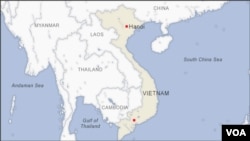The government of Vietnam used charges of tax evasion to jail four dissidents known as the Vietnam Four for their roles in climate activism, a human rights group says in a new report.
The 88 Project is a Vietnam human rights group headquartered in the U.S. city of Chicago, Illinois. Its 88-page report, called "Weaponizing the Law to Prosecute the Vietnam Four," documents how authorities in Vietnam have cracked down on four Vietnamese climate activists, charging them with tax evasion and sentencing them to prison in a closed-door hearing.
The "Vietnam Four" activists — Dang Dinh Bach, Nguy Thi Khanh, Mai Phan Loi and Bach Hung Duong — advocated for the government to reduce its reliance on coal and commit to a policy of net zero carbon emissions by 2050. Vietnam has the 19th-biggest known coal reserve in the world.
Ben Swanton, co-director of Project 88, released the findings of the group’s investigation at the Foreign Correspondents Club Thailand in Bangkok on Friday.
The group reviewed 90 court verdicts of individuals who were convicted of tax evasion in Vietnam between 2017-2022. Findings show it is rare for people to be criminally prosecuted for tax evasion on personal income in Vietnam. But that's what happened to Nguy Thi Khanh, a renowned climate activist and recipient of the Goldman Environment Prize.
As for Bach, Loi and Duong, they were all charged with evading taxes on corporate income. However, it is unclear under Vietnamese law if local non-governmental organizations had to pay corporate tax at the time of the arrests.
According to Project 88, 81 percent of people convicted of tax evasion during the five-year period did not serve prison time but all four activists are currently incarcerated.
Dang Dinh Bach received a five-year prison sentence in January 2022, while Mai Phan Loi and Bach Hùng Duong were sentenced the same day but had their prison time reduced to 45 months and 27 months respectively after a ruling by a court in Hanoi. Khanh was sentenced to two years in June 2022.
All four individuals were held in pre-trial detention, another rarity for tax evasion charges.
'These irregularities are strong evidence to suggest abuse of process and arbitrary application of the law. They also indicate that the charges, detention and punishment of the Vietnam Four were neither necessary nor proportionate but rather appear to have been designed to silence these individuals and remove them from society, thereby violating their right to freedom of expression and right to participate in public affairs," Project 88 states on its website.
Security agency gets involved
The dossier also reveals how the Vietnamese government's Security Investigations Agency was involved in the criminal investigations. By law, the agency only has authority to investigate serious crimes related to national security and war. The investigations must be approved by Vietnam Minister of Public Security To Lam.
"It's completely outrageous that the Vietnamese government is arbitrarily using criminal law to persecute the people leading the fight to save the planet," Swanton said.
What's garnered more criticism is that despite the climate activist crackdown, Vietnam have agreed to a $15 billion energy transition deal with G-7 nations that includes Canada, France, Germany, Italy, Japan, the United Kingdom, and the United States.
The energy deal will help Vietnam reach its highest output of greenhouse gas emissions sooner and gain 47% of its power from renewable energy by 2030, Reuters reported.
"It's also outrageous that the G-7 is rewarding the government with a $15 billion energy transition deal that makes no concrete human rights demands. Vietnam should immediately release Dang Dinh Bach and other activists who are being arbitrarily detained and the G-7 should condition financial aid for Vietnam's energy transition on the government not arresting any more activists," Swanton added.
VOA requested comment from the Vietnam government but has not received a reply.
Phil Robertson, deputy Asian director of Human Rights Watch, also spoke at Friday's press conference.
"There is no justice or independence in Vietnam's judiciary," he said. "And to add insult to injury, the police routinely deny legal counsel to defendants. Now we see this attack broadened and starting to hit civil society groups, starting with the four leaders of these climate change NGOs. The government and party's absolute drive for power in Vietnam and destruction of any sort of activist or civil society structures looks an awful lot like what's happening in China. Across the board Vietnam looks like a mini-China. Vietnam is following in lockstep."
Government limits groups' influence
Vietnam is a one-party Communist state in Southeast Asia. The government has complete control over the state's functions, social organizations and media. Although Vietnam has one of the fastest growing economies in the region, it has a poor reputation on corruption, political censorship, human rights and civic society.
Since Vietnam Communist Part General Secretary Nguyen Phu Trong came to power in 2016, Vietnam has seen measures limiting the influence of civil society organizations, both rights groups say.
Vietnam issued Decree 58 to its rulebook in November amending rules that prohibit foreign non-governmental organization groups from receiving donations, calling for sponsors, or raising funds from Vietnamese organizations or individuals.
Activist asks world to refocus
Robertson called for the international community to refocus on Vietnam's human rights issues, having been distracted from recent global events, such as the COVID-19 pandemic, Russia's invasion of Ukraine, and the Myanmar coup.
"I hope we can find a way for the international community to find the political will to once again put human rights issues on the front burner rather than burying it in the backyard," he said.





